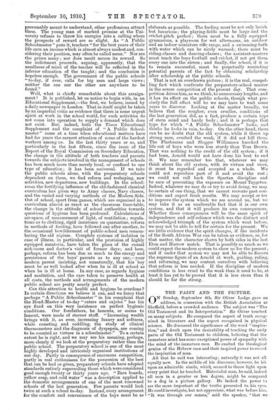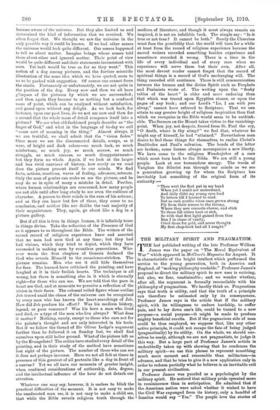THE PAINT AND THE PICTURE.
ON Sunday, September 4th, Sir Oliver Lodge gave an address, in connexion with the British Association at Sheffield, before a crowded audience. The subject was " The Old Testament and its Interpretation." Sir Oliver touched on many subjects. He compared the aspect of truth recog- nised in literature and the aspect recognised in physical science. He discussed the significance of the word "inspira- tion," and dwelt upon the desirability of teaching the early parts of the Old Testament to children, believing that the immature mind has some exceptional power of sympathy with the mind of the immature race. He exalted the theological genius of the Hebrew race and their inspired power to record the inspiration of man.
All that he said was interesting ; naturally it was not all equally new. In the middle of his discourse, however, he hit upon an admirable simile, which seemed to throw light upon every point that he touched. Materialist man, he said, indeed all men in a greater or less degree, might be compared to a dog in a picture gallery. He lacked the power to see the more important of the truths presented to his eyes. He could investigate, but not appreciate, what was before him. "It was through our senses," said the speaker, "that we became aware of the universe. But they also limited us and determined the kind of information that we received. We often forgot that. We thought we saw the universe in the only possible way it could be known. If we had other senses the universe would look quite different. Our senses happened to tell us about matter. Imagine beings whose senses told them about ether and ignored matter. Their point of view would be quite different and their statements inconsistent with ours. Yet both would be true as far as they went." This notion of a dog among pictures, and the further scientific illustration of the same idea which we have quoted, seem to us to be packed with suggestion. Of course one cannot force the simile. Fortunately or unfortunately, we are not quite in the position of the dog. Every now and then we all have glimpses of the pictures by which we are surrounded ; and then again they become to us nothing but a confused mass of paint, which can be analysed without satisfaction, and gazed upon without any delight. As we look back, for instance, upon our past lives, do we not see now and then for a second that the whole mass of detail composes itself into a picture ? We see what old-fashioned people describe as " the finger of God," and what in the language of to-day we call "some sort of meaning in the thing." Almost always, if we are truthful, we shall admit that the " vision fades." Once more we see the disconnected details, scraps, as it were, of bright and dark colour—so much luck, so much misfortune, so much joy, so much sorrow, so much struggle, so much success, so much disappointment— but they form no whole. Again, if we look at the larger and less vivid canvases of history, how rarely as we read does the picture present itself to our minds. We find facts, actions, reactions, waves of feeling, advances, retreats. Only the man of genius can make us see the picture, and he may do so in spite of many a mistake in detail. Further, where human relationships are concerned, how many people are not able until after long study to see even the outlines of character. A person to their minds is the sum of his actions ; and as they can know but few of these, they come to no conclusion, and neither like nor dislike the vast majority, of their acquaintance. They, again, go about like a dog in a picture gallery.
But if all this is true in things human, it is infinitely truer in things divine. Take the reflection of the Presence of God as it appears to us throughout the Bible. The writers of the sacred record of religious experience knew and asserted that no man had seen God at any time ; but they bad had visions, which they tried to depict, which they have succeeded in making seen by countless generations. Who- ever wrote the first chapters of Genesis declared the God who reveals Himself to the conscience-stricken. The picture remains. Men who see it still hide themselves for fear. The learned have criticised the painting, and have laughed at it in their foolish hearts. The technique is all wrong, but there is something else in it which is eternally right—for those who can see. We are told that the pure in heart see God, and at moments we perceive a reflection of the vision in their faces. The colossal veiled figure whose outline Job traced amid the chaos of the universe can be recognised by every man who has known the heart-searchings of Job. How did Job produce his effect? Was his medium history, legend, or pure romance P Was his hero a man who lived and died, or a type of the men who live always ? What does it matter ? Nothing, surely, except to those who care not for the painter's thought and are only interested in his tools. But if we follow the thread of Sir Oliver Lodge's argument further than he followed it on Sunday last, we shall find ourselves upon still holier ground. What of the picture left us by the Evangelists? The critics have studied every detail of the painting, and in their study of the method have sometimes lost sight of the picture. The number of those who can see it does not perhaps increase. Have we not all felt at times in presence of this greatest of all portraits like a dog in front of a canvas ? Yet we all have our moments of greater insight, when continual considerations of authorship, date, dogma, and the intellectual influence of the hour do not detach our attention.
Whatever one may say, however, it is useless to blink the practical difficulties of the moment. It is not easy to make the uneducated man see, it is not easy to make a child see, that while the Bible reveals religious truth through the medium of literature, and though it must always remain an inspired, it is not an infallible book. The simple say : " Is it true or not true ? It cannot be both." Surely the Churches must face the possibility that the world will turn for a while at least from the record of religious experience because the sacred writers recorded something besides experience and sometimes recorded it wrong. There is a time in the life of every individual and of every race when no experience will serve them but their own. After all, the most devout reader cannot forget that the record of spiritual things is a record of God's unchanging will. The thing recorded still continues. There is still communication between the human and the divine Spirit such as. Prophets and Psalmists wrote of. The writing upon the " fleshy tables of the heart" is older and more enduring than that which was traced upon Egyptian stones, or upon the pages of any book ; and our Lord's "Lo, I am with you alway," cannot have referred to Scripture. That we can attain to any greater height of religious inspiration than that
which we recognise in the Bible would seem to be unthink-
able. The Sermon on the Mount takes virtue to the vanishing- point. When joy, not despair, forced from St. Paul the cry, " 0 death, where is thy sting P" we feel that, whatever he might say of himself, he had "attained." Nevertheless men desire to feel these things for themselves, to realise Christ's Beatitudes and Paul's salvation. The bonds of the letter are broken; some license always accompanies a new liberty. We have come to the religious Wanderjahre of a race which must turn back to the Bible. We are still a young people. Look at our tremendous energy. The words of Vaughan the Silurist run through our minds as we see a generation growing up for whom the Scripture has inevitably lost something of the original form of its authority Thou wert the first put in my hand
- When yet I could not understand, And daily didst my young eyes lead To letters till I learned to read. But as rash youths when once grown strong Fly from their nurses to the throng, Where they new consorts choose, and stick To those till either hurt or sick, So with that first light gained from thee Ran I in chase of vanity, Cried dross for gold, and never thought My first chap-book had all I sought."







































 Previous page
Previous page